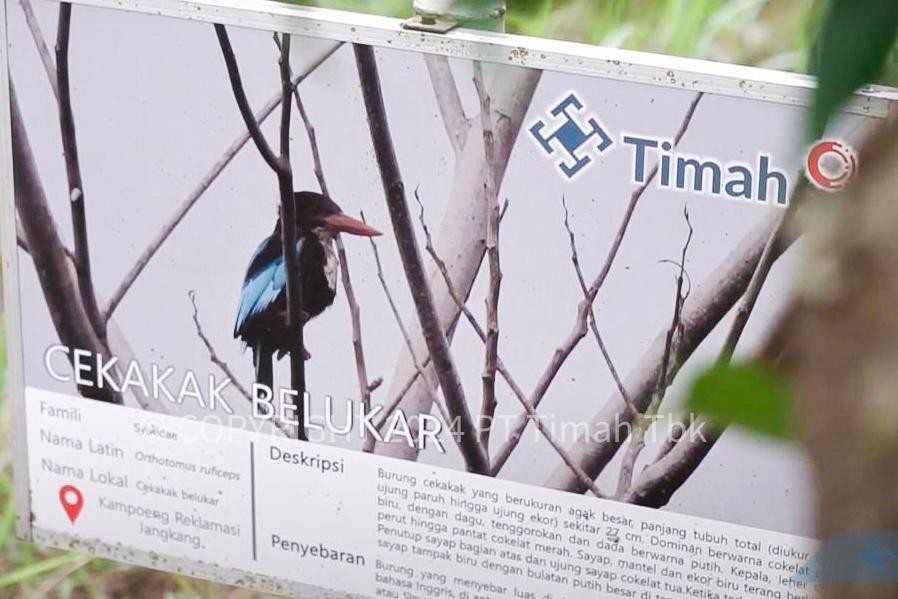
PANGKALPINANG — PT Timah is not only committed to business sustainability but also continues to prioritize the preservation of biodiversity and wildlife in its operational areas.
This commitment aligns with PT Timah’s dedication to implementing Environmental, Social, and Governance (ESG) parameters, specifically focusing on biodiversity conservation.
One of PT Timah’s efforts in biodiversity preservation includes wildlife conservation and rehabilitation programs, which focus on protecting and rehabilitating ecosystems.
Wildlife conservation is carried out through the KEHATI (Biodiversity) program, which operates across all of PT Timah Tbk's operational areas in the Bangka Belitung Islands Province and the Kundur Karimun Region.
In partnership with the Alobi Foundation, PT Timah also established the Alobi Wildlife Rescue Center (PPS) in the Kampoeng Reklamasi Air Jangkang area. Hundreds of protected animals are rehabilitated on a former mining site.
This rehabilitation effort began in 2018, and a variety of species have been, and are still being, rehabilitated at the PPS Alobi Air Jangkang, including the sun bear, cockatoos, peacocks, sambar deer, gibbons, slow lorises, mentilin, crocodiles, binturongs, and other species, including endemic animals of Bangka Belitung.
Endy R. Yusuf, Manager of PPS Alobi Air Jangkang, stated that the hundreds of protected animals being rehabilitated at the center come from law enforcement operations, public handovers, and rescue efforts from the local community.
Endy added that the 4-hectare former mining land now houses 37 animal enclosures, monitoring towers, offices, clinics, and other facilities to support wildlife rehabilitation.
He noted that nearly all of the enclosures are filled with animals, especially given the increasing negative interactions between wildlife and humans in Bangka Belitung, particularly crocodiles, due to the damaged ecosystems caused by illegal mining.
“Over the past few months, many endemic slow lorises from Bangka Belitung have been handed over to us because of negative interactions between humans and animals. These animals are leaving their habitats because their ecosystems are disrupted. This includes crocodiles, where the number of cases is increasing,” Endy explained.
The rehabilitation efforts at PPS Alobi aim to restore the wild instincts of the animals while also preparing them physically and environmentally. Thus, when they are eventually released, the animals can survive in the wild and contribute to rebuilding ecosystems.
Once rehabilitated and deemed ready, these animals will be released back into their natural habitats. The hope is that this will not only preserve the populations of protected wildlife but also help increase them.
Endy expressed his appreciation for PT Timah Tbk’s commitment as a mining company that has consistently supported wildlife preservation.
“Rehabilitation is not just about planting trees. Restoring ecosystems requires the role of wildlife,” Endy said.
He further explained that at PPS Alobi, conservation efforts are aimed at maintaining the existence of wildlife in nature. The presence of wildlife is crucial for the health of the environment.
“Since 2018, PT Timah has remained consistent in supporting activities at PPS Alobi. Mining impacts the ecosystem, but it can be managed with the principle of 'take what we need, give what we can.' Tin resources are essential for various industries, including the technology we use, but it must be carried out under the principles of Good Mining Practice,” he said.
“PPS Alobi is another form of reclamation conducted by PT Timah, meaning PT Timah, as a mining company, is fulfilling its responsibility to conserve and rehabilitate protected wildlife,” he added.
In addition to rehabilitating wildlife, PT Timah, as part of the MIND ID mining industry holding, also carries out land rehabilitation aimed at recreating habitats that support the lives of wild animals. This is done by planting various indigenous plant species to provide food sources and shelter for wildlife.
Furthermore, the company conducts regular environmental monitoring, including flora and fauna assessments in Hutan Kehati, to ensure that the rehabilitated areas can genuinely serve as safe homes for wildlife. (*)